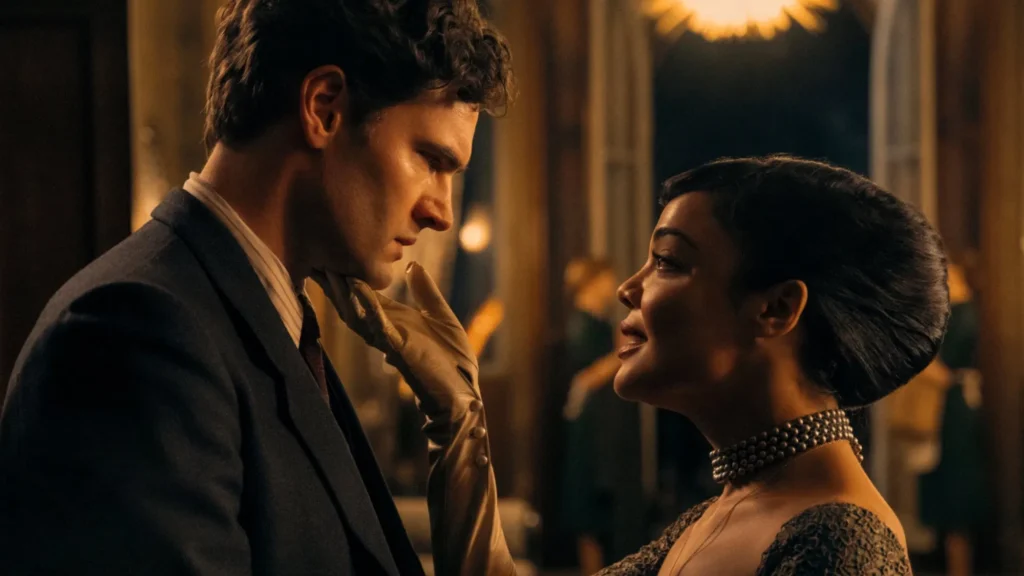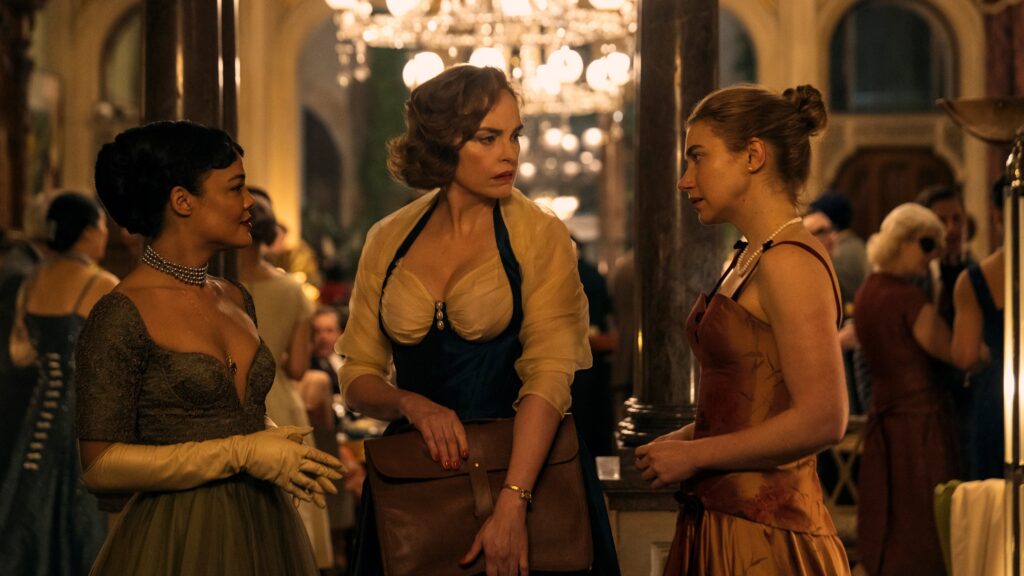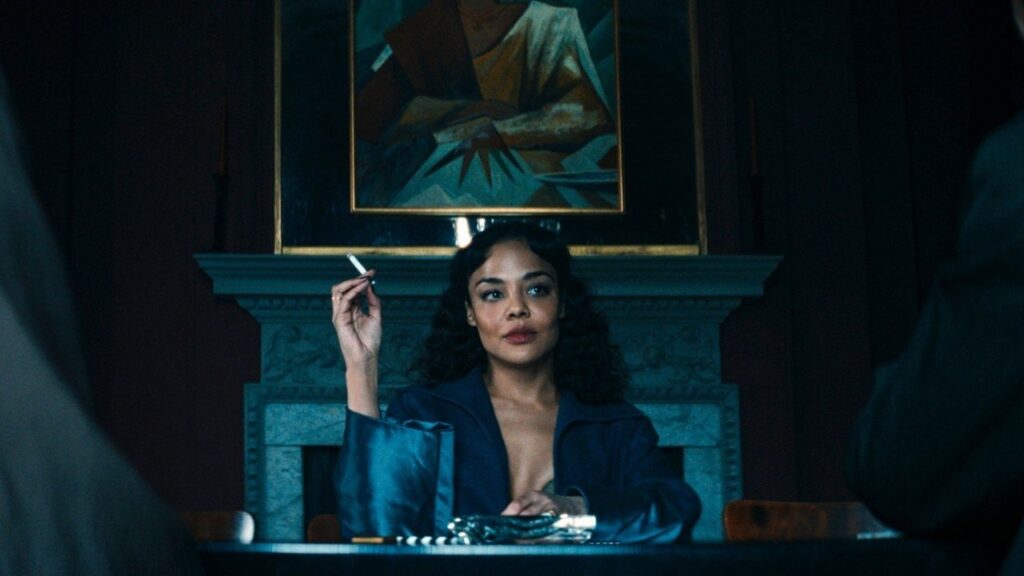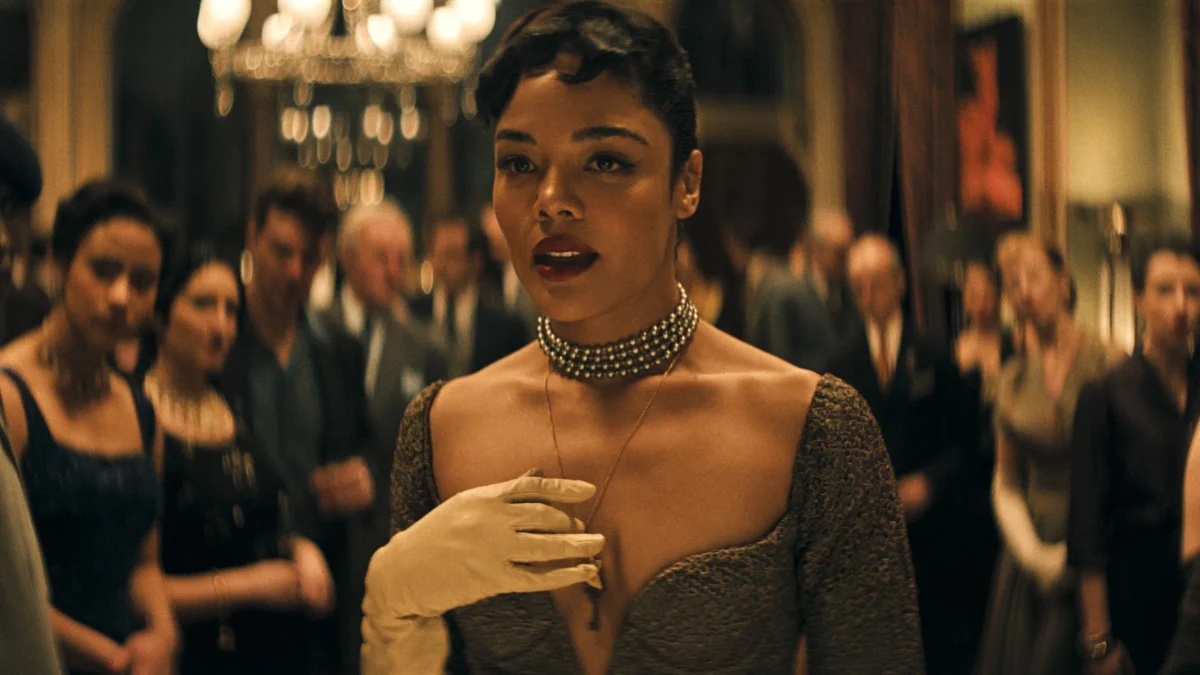Not the Hedda the pack
Hedda is a movie I can easily imagine a small subset of viewers declaring the best of the year, and I am very sure I am not one of those people. Nia DaCosta’s film reimagines Henrik Ibsen’s Hedda Gabler as a 1950s English countryside rager: one long, increasingly dramatic party where Hedda Gabler (Tessa Thompson) floats from room to room, poking at everyone’s deepest insecurities. I know the original play is a towering classic about a complicated woman grappling the institutions that control her, but only because I read about it after the credits rolled. I, alas, have very little background in Ibsen, and I think that lack of knowledge is part of what kept me at a distance. Such are the travails of a math and computer science major writing about movies, a band geek rather than a theater kid. This movie made me feel that gap more than anything I’ve watched in a while.
The basic setup is fun-shaped and juicy on paper. Hedda is stuck in a achingly practical marriage to earnest academic George Tesman (Tom Bateman), spending a weekend at a lavish estate as he tries to court donors and impress colleagues, hoping for a new professorial appointment. Into the mix walks Hedda’s brilliant former lover Eileen Lovborg (Nina Hoss), now a rising academic star of her own with a new partner and collaborator, Thea Clifton (Imogen Poots). Judge Roland Brack (Nicholas Pinnock) lurks at the edges, something obviously on his mind. And a handful of others float in and out of the story. Over the course of one night, secrets, desires, and professional jealousies all crash together.

That sounds fun enough! But I grew skeptical from the opening moments. Hedda opens the day after, with the aftermath of some unseen calamity (suggested to be a shooting), before jumping back a day to show us how things got so bad. This is a structural choice that, for me, immediately screams, “We don’t trust this story to hook you on its own.” And if you don’t trust your story, why should I? Plenty of stories have made it work (I mean, Sinners does it), but it’s a red flag.
Conceptually, I’m into what DaCosta is reaching for. The film explicitly queers and re-racializes Ibsen’s story, giving us a Black, bisexual Hedda and a sapphic history with Eileen, all restaged in mid-century England rather than 19th-century Norway. It’s a semi-modernization — sexed up, more openly about modern identity issues, but still trapped in corsets, cigarette holders, and finely polished drawing rooms. The problem is that this “halfway there” approach ends up neither fish nor fowl: The movie wants to have a Bridgerton-adjacent anachronistic looseness without fully figuring out what this says about the story’s content or tone, so the updated identities feel more like production design than lived reality.
The party framing should help. In theory, putting everything inside an escalating, alcohol-sloshed gathering is a smart way to crack open a static stage story: you get movement, music, overlapping conversations, the thrill of steadily escalating chaos. Booze and betrayals and covert hookups do indeed flow. But it leaves so little impact. The film simply has too many characters, and too few of them stand out, so it’s hard to be invested in anything that happens. For example, three different women are juggling academic constraints with semi-closeted attractions to other women. The arcs smear into each other, and I began to suspect the screenplay assumed we already knew which dynamics mattered because we knew Ibsen, like listening to a jazz performer mixing up “My Favorite Things” for a crowd who already knows Coltrane inside and out.

Thompson’s Hedda is fascinating to watch moment to moment. She has a coiled, almost mathematical precision to how she modulates charm and contempt. But the performance never quite deepens as the night goes on. Awards chatter has circled around her work here, and I get it: this is a commanding presence in a showy role. I just rarely felt like there was a second, secret Hedda under the one we meet in the opening scenes. Every impulse, every controlled maneuver is so clearly telegraphed that her big choices land as inevitable rather than shocking or revelatory.
The supporting cast is in the same boat: pleasant to watch, not especially vivid. Hoss gives Eileen a wounded gravitas; Poots plays Thea as on the verge of a breakdown but never getting there; Bateman leans into George’s oblivious steely charm. They’re all perfectly fine, and yet they blur together in my memory. The movie keeps telling us these people have knotted histories and rich inner lives, but it mostly expresses that through exposition bursts and costume design rather than behavior.
From a craft standpoint, Hedda is sturdy but anonymous. Sean Bobbitt’s cinematography supplies the requisite prestige sheen, but I never felt the form ratcheting up the tension or complicating the text. The party setting should feel like a maze or a pressure cooker; instead, it’s just a nice-looking house we keep circling through. I had to watch the party scene from Babylon as a chaser to remember this stuff can have real seduction and pulse.

The period production details also suffer by comparison to how spoiled we’ve been recently. This is no Emma, no Nosferatu, no Mad Men. (Though set in the 1950s, not much specifically places it there — it could be set fifty years earlier pretty easily.) The set and costume design hover in an awkward space between decadent fun and stately mahogany, with the film never fully committing to either. Hoss’s character wears an outfit so aggressively unflattering that I spent the entire movie trying to decide whether I was supposed to be laughing at it or not. (That outfit does at least end with a punchline about fabric being see-through when it’s wet.)
All of this is extra disappointing because I really want to like DaCosta. This was my first time seeing a film by her, and I had heard more positive than negative about her past films, so I came in optimistic. I appreciate the diversity of voices and backgrounds of our rising generation of directors like DaCosta, who is young and Black, and am encouraged to see someone from underrepresented groups getting the chance to make movies with big toys and budgets to play with: she directed The Marvels and the upcoming Part 2 of 28 Years Later. Here’s hoping she better shows her chops and instincts in her other projects.
Hedda, though, feels like a project made by theater kids for theater kids, an act of reverent tinkering with a classic text rather than a movie that genuinely wants to bring new people into the fold. For Ibsen devotees and lifelong stage geeks, this might play like a subversive remix. From my vantage point, it mostly plays like listening to someone else’s half-explained inside joke from across the room.
Is It Good?
Not Very Good (3/8)
Dan is the founder and head critic of The Goods. Follow Dan on Letterboxd. Join the Discord for updates and discussion.

